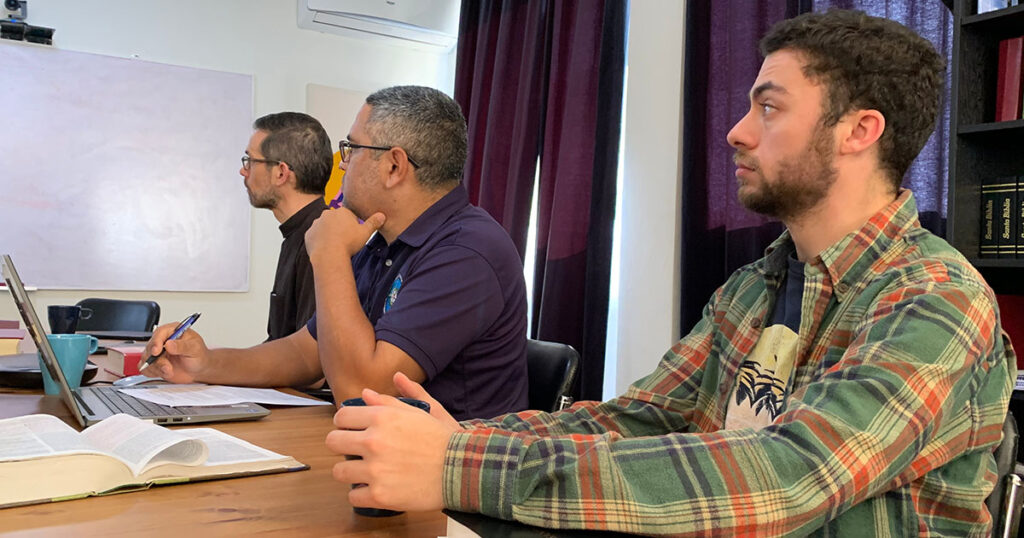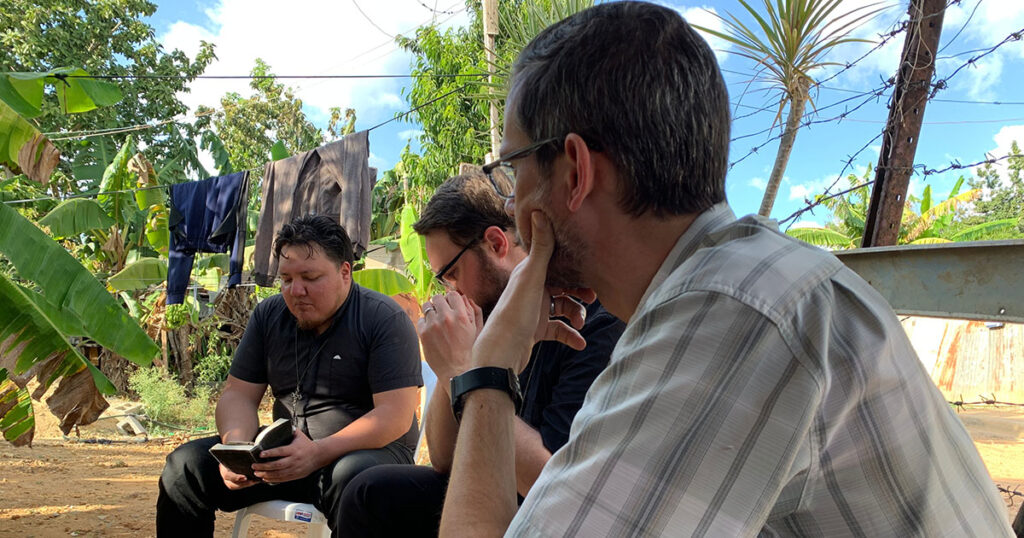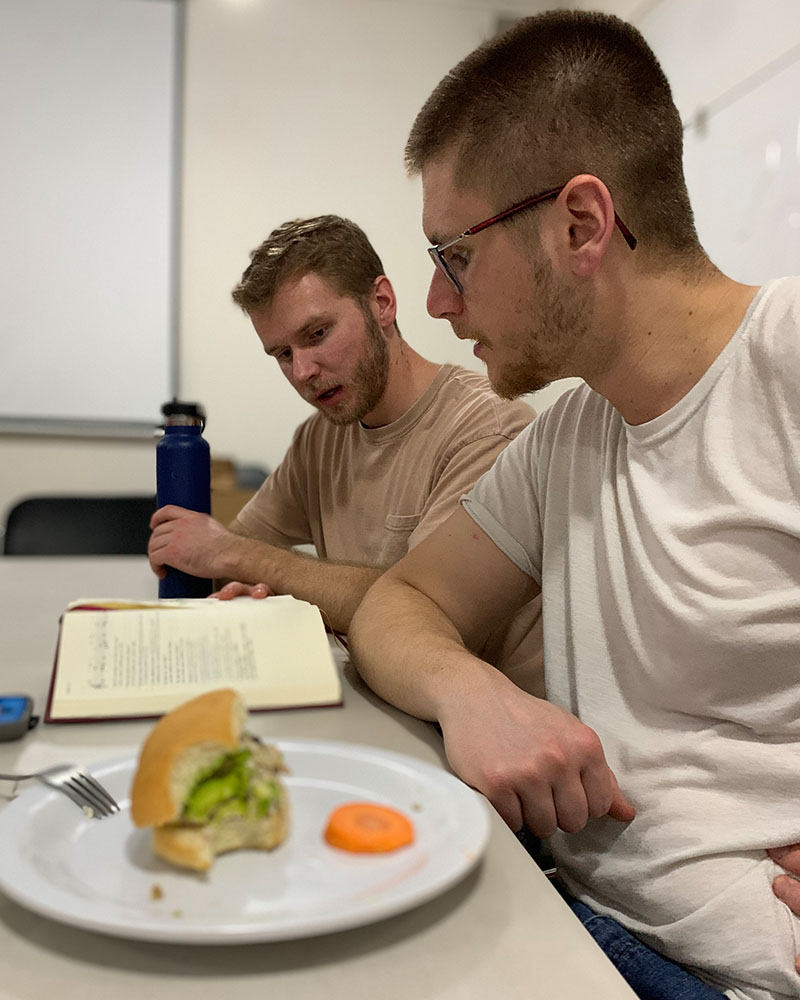
Members of an LCMS International Mission education team from Concordia Seminary, Fort Wayne, Ind., sit next to Jesús Barceló (center), a student at Concordia the Reformer Seminary in Palmar Arriba, Dominican Republic, during a class in February 2024. (Photo courtesy of Erin Mackenzie.)
Patrick W. Randolph is a seminarian at Concordia Theological Seminary in Fort Wayne, Ind., a seminary of The Lutheran Church—Missouri Synod. He is finishing his fourth and final year of the M.Div. program. In the summer of 2024, he will begin his studies in the master of Sacred Theology program at the same seminary. After that, Patrick is looking toward serving as a missionary pastor and theological educator both at home and abroad. He is from northwest Ohio.
By Patrick W. Randolph, LCMS short-term mission team member
As a seminary student, I have a different view of the mission field. I look out and ask the question, “Where do missionaries come from?” To answer this question, I went on a trip to the Dominican Republic in February 2024 to visit our partner seminary: Concordia El Reformador, located in Palmar Arriba, a suburb of Santiago.
However, I attend a different Concordia, the seminary in Fort Wayne, Ind. One of my professors, Dr. Benjamin Mayes, led a group of 11 students on this trip. We headed out on a snowy morning at the end of February and stayed in the sunny Dominican Republic for 12 days. We all looked forward to learning something about the foreign mission field, Hispanic ministry and the Spanish language. But I wanted to learn how a seminary looks in a mission context.
After all, I am constantly amazed at the support system I have at Fort Wayne. We are blessed with a heritage of Lutheran churches and with generations of people who value Christ as He comes to us in Word and Sacrament.
Consider how many buildings we have solely at the Fort Wayne seminary, let alone the beautiful architecture at Concordia Seminary, St. Louis or our Concordia universities. We have libraries stocked with volumes of history and doctrine. Our co-ops are filled with food and supplies from the many neighboring Lutheran churches. It’s an embarrassment of riches!
To prepare for this shift, Dr. Mayes assigned an article — one of the longest I’ve ever been assigned for a class. It was a summary of the 150-year history of Lutheran theological education in Latin America as told by one of its own: Sergio Fritzler. Rev. Fritzler is a product of Latino Lutheran seminaries in Argentina and Brazil, and he has risen to leadership in education. The article was a rapid-fire history, only because there is so much to tell.
This history is of excitement and theological integrity but also scarcity of resources. Not every idea was a success. Yet every generation of Christians has risen to the task of preaching the Gospel, and Christ has blessed their efforts with the gifts of the Spirit.
After being acquainted with such a rich history, I was ready to see the task firsthand.

Members of an LCMS International Mission education team from Concordia Seminary, Fort Wayne, Ind., join Freddy Otuvo (left), a student at Concordia the Reformer Seminary in Palmar Arriba, Dominican Republic, on a home visit in the Las Américas neighborhood of Santo Domingo, Dominican Republic in February 2024. (Photo courtesy of Erin Mackenzie.)
What do they learn?
The curriculum at Concordia El Reformador gives the best of what my seminary offers — with an even greater focus on field work.
The program is four years with no vicarage. However, constant field work in congregations, mission work and visitation more than makes up for that.
The first year solidifies students’ Spanish skills. They need to be masters of their native tongues.
The second year immerses them in Greek, so they can study the New Testament as the apostles wrote it.
The third year brings them to Hebrew, so they can begin to dive into the Old Testament.
The fourth year, oddly enough, stresses English. Seminario Concordia El Reformador recognizes and values how much great Lutheran material is available in English. The seminary encourages students to continue their studies in Lutheran theology. English is a great way to access classical Lutheran theologians like Luther, Chemnitz and Gerhard.

Seminarians from Concordia Theological Seminary, Fort Wayne, Ind., held Spanish Vespers at the end of the first day of their LCMS International Mission education trip to the Dominican Republic in February 2024. (Photo courtesy of Erin Mackenzie.)
The seminarians’ education is not just language, however central that is. We found them constantly reading in classes, cycling through the Scriptures and the Book of Concord so that every inch is familiar to them. As in The Lutheran Church—Missouri Synod, these men are expected to pledge their sacred honor to the Lutheran Confessions. They want to know what they are pledging to, and they find wonderful things there.
We sat in on a class led by LCMS missionary Rev. Daniel Conrad. He walked the students through the doctrine of justification, as presented in the Apology to the Augsburg Confession. It was deep theology, and the men were happy to discuss it.
The next class I sat in on was Homiletics, the art of preaching. This class was led by no one else than Rev. Sergio Fritzler. The textbooks were familiar, and so were the Bible passages. The men studied the simple questions we all ask when we approach a Bible passage: What do I see of God’s Law, and what do I see of God’s Gospel?
Rev. Fritzler pressed his students. These were deep questions. If they would apply the Bible to their people, these intended pastors really have to know what the Bible says. I was impressed by the gravity of their approach. After all, there is nothing more important than giving out the Gospel to needy people.

Rev. Ted Krey (back left), LCMS International Mission Director of the Latin America & Caribbean region, leads a Bible study on the essence of Lutheran missiology for Concordia Theological Seminary, Fort Wayne, Ind. seminarians during their February 2024 trip to the Dominican Republic. (Photo courtesy of Erin Mackenzie.)
The same Jesus
After the class, I sat down to interview Rev. Fritzler about teaching preaching. To help me with my Spanish, I brought along a bilingual seminarian from Fort Wayne. With laughter as well as conviction, Fritzler helped me sort through the problems that come from changing preaching based on culture.
Fritzler knows well, as an Argentinian of German heritage, what cross-cultural missions are. It was not long ago that Argentina had many German speakers, as did America in the 1800s. Fritzler is a newer kind of Hispanic Lutheran pastor, and he is doing his part to guide Spanish speakers through all the nuances of Lutheran doctrine.
Fritzler shared an insight with me: Hispanic Lutherans are coming to maturity as real stewards of God’s Word, not merely recipients of it. They are not only recipients of American Lutheran assistance but partners in the mission of Christ. They have the same Word that we do in all the clarity of the Lutheran doctrine.
I could see the answer to my question clearly.The context of mission does not change the goal of pastoral education. There are people everywhere who walk without faith in Christ, and they need to hear clearly what He has done for them. Churches need to be built up soundly on the true faith.
Those seminarians in the Dominican are heading to diverse places. They know where they are headed, and the specific problems and praises of each place. But they all need to know the same Christ, the same Scripture, the same Sacraments, the same Confession and the same task of preaching. There is no wall of separation between us, as if each culture gets a different Christ (Eph. 2:14).
Therefore, the same seminary education can be edifying for all. Fritzler’s article observes that problems arise when we start trying to give a different Jesus to each ethnicity, instead of letting Jesus save us all equally. Seeing the Dominican seminary, and the strong preachers it produces, made that very clear.
Each of those men were being sharpened to go to their respective countries, like spearheads against Satan. Every day of their fieldwork in the Dominican Republic is a blessing to the countries to which they will return. Satan is trounced underfoot as they go out with God’s strong Word.
I hope I can do the same in my country, and, if the Lord calls, in other countries. I returned to my studies with joy, remembering why I came to my own seminary in the first place.
Please continue your prayers and support for our seminaries in the United States so more and more men may go out into the harvest fields for Christ. Pray also that the Concordia El Reformador Seminary would grow and continue its wonderful work.
Learn more about the work of Concordia El Reformador and consider whether God is calling you or someone you know to serve as a missionary.